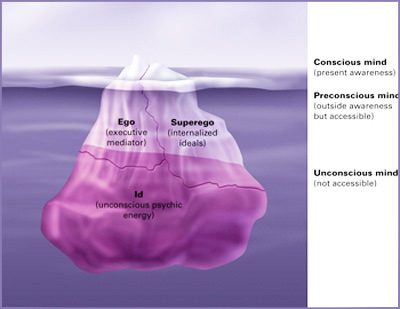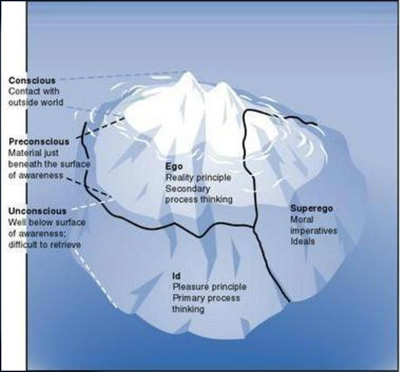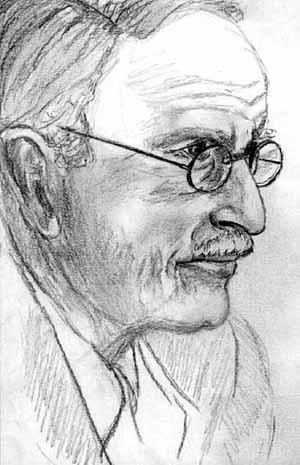Personalities
 |
 |
 |
 |
 |
 |
 |
Freud’s Mechanistic Vision
of the Human Psyche
Continuing on with my study of Freud’s ideas, I will focus today on his general vision of the human psyche and of man’s nature in general.
In many of his minor studies and lectures Freud addressed those topics, but it was in his last analytical work on the human psyche that he postulated his theories in a more complete form. This was his famous The Ego and the Id, a work that he published in 1923 in Vienna, Austria. It was his final work on Psychoanalysis properly speaking.

 In this work, Freud reveals his complete conception of the psyche, his general view on how the human mind works.
In this work, Freud reveals his complete conception of the psyche, his general view on how the human mind works.
He divided man’s mind into three principal parts.
The first is the ego, the conscious part of man. Man walks, thinks and makes conscious decisions: Behold the ego.
The second part is the unconscious, the more important part from where all the instinctive impulses come: the passions, sexuality, the capacity to feel, hate and even love men.
Finally, the third part is the super-ego, which are the ensemble of our moral laws, rules and mental defenses that in some way protect us from the force of our unconscious instincts.
He named these parts the ego, the id and the super-ego. They constitute the basis of his theory on how the human mind works. For him these three parts are always active and influencing one another.
For him, the most primitive part is the unconscious or id, which, in final analysis, is responsible for the desires, acts of will and the deepest longings of the human soul.
Freud was completely atheistic and materialistic. As a typical 19th century scientist, he was influenced by Positivism, although he never admitted it or even spoke about it.
Hatred for philosophy & religions
I want to stress that in this study Freud demonstrated his hatred for Philosophy and Religion. He thought that they were natural enemies of science, which he placed in the first and only place of importance. For him, the study of any discipline other than science was a hindrance to the march of progress in society. He sets out this view in his book The Future of an Illusion, written in the 1930s.
Almost all of Freud's biographers report his strong aversion from his childhood to philosophy, religion and even music. For example, at his request, his parents forbade his sister, who had a clear talent for piano and a liking for classical music, to study and play this instrument because, according to the young Sigismund, “it was an obstacle to his study of the sciences.” He could not bear even the sound of a piano. Later, his sister complained strongly about this imposition.
He was able to impose his inclinations because he was the only male child of a traditional Jewish family that complied with the whims of a son.
Later, he would tell his young disciple Carl Gustav Jung – who afterwards became an ideological enemy – that Psychoanalysis should remove itself completely from the “dangers” of Philosophy.
Freud paid a high price for not acknowledging the great masters of philosophical thinking.
Let us not forget that Plato stated that “philosophy is the thinking that explains the true nature of reality.” Philosophy teaches us to think. To study it is absolutely necessary for anyone who wants to deeply understand things and man.
Freud hated all this, and he ended by becoming a victim of the positivist errors of his epoch.
 He believed that one day science would find in the human brain what he identified as the structures of the human personality, that is, the ego, the id and the super-ego. This would configure a mechanistic, capricious and simplistic system of thought.
He believed that one day science would find in the human brain what he identified as the structures of the human personality, that is, the ego, the id and the super-ego. This would configure a mechanistic, capricious and simplistic system of thought.
Now then, Aristotle in his studies of Metaphysics already affirmed that “the being operates according to its nature.” This means that a material thing can only produce another material thing. Thus, of itself the human brain, which is matter, flesh, cannot produce consciousness, will or the abstract thoughts of man.
A piece of flesh like the human brain, although complex with its hormones, synapses and natural network of neurons, cannot produce abstractions, thoughts and other spiritual actions typical of human beings.
A television or a radio can transmit programs, but cannot produce them. So also, the human brain can pass on ideas but it does not produce them. They are elaborated by the human soul.
Thus, Freud, like so many other materialist and atheistic authors, blatantly erred.
For Freud man is nothing but a mass of cells, nerves and hormones. With this thesis he greatly harms human liberty and the correlated conception of free will. Man becomes incapable of freely and fully “deciding” his actions. He becomes a victim of his fears, passions and unconscious desires.
This is tantamount to renouncing the liberty to make decisions and bear their consequences in this world and in the next. In final analysis, man is an irresponsible and capricious being.
I must say that Freud did not call for abolishing punishments for all kinds of criminals in society. But this is the conclusion that we naturally reach when we study his extremely pessimistic vision of human nature.
Today, most psychoanalysts no longer endorse such a gloomy notion of mankind. A large movement in the field is trying to re-think the mechanistic, simplistic ideas of Freud. Psychoanalysis is being re-scrutinized from top to bottom.
It is my hope that these revisions will reach the crux of the question, which is the true nature of the human soul.
In my next article I plan to address the role of Carl Gustav Jung in the destruction of Freud’s system and the importance of Religion for the stability of human psyche.
Continued

In many of his minor studies and lectures Freud addressed those topics, but it was in his last analytical work on the human psyche that he postulated his theories in a more complete form. This was his famous The Ego and the Id, a work that he published in 1923 in Vienna, Austria. It was his final work on Psychoanalysis properly speaking.

The iceberg metaphor to understand the ego, id and super-ego

He divided man’s mind into three principal parts.
The first is the ego, the conscious part of man. Man walks, thinks and makes conscious decisions: Behold the ego.
The second part is the unconscious, the more important part from where all the instinctive impulses come: the passions, sexuality, the capacity to feel, hate and even love men.
Finally, the third part is the super-ego, which are the ensemble of our moral laws, rules and mental defenses that in some way protect us from the force of our unconscious instincts.
He named these parts the ego, the id and the super-ego. They constitute the basis of his theory on how the human mind works. For him these three parts are always active and influencing one another.
For him, the most primitive part is the unconscious or id, which, in final analysis, is responsible for the desires, acts of will and the deepest longings of the human soul.
Freud was completely atheistic and materialistic. As a typical 19th century scientist, he was influenced by Positivism, although he never admitted it or even spoke about it.
Hatred for philosophy & religions
I want to stress that in this study Freud demonstrated his hatred for Philosophy and Religion. He thought that they were natural enemies of science, which he placed in the first and only place of importance. For him, the study of any discipline other than science was a hindrance to the march of progress in society. He sets out this view in his book The Future of an Illusion, written in the 1930s.
Almost all of Freud's biographers report his strong aversion from his childhood to philosophy, religion and even music. For example, at his request, his parents forbade his sister, who had a clear talent for piano and a liking for classical music, to study and play this instrument because, according to the young Sigismund, “it was an obstacle to his study of the sciences.” He could not bear even the sound of a piano. Later, his sister complained strongly about this imposition.
He was able to impose his inclinations because he was the only male child of a traditional Jewish family that complied with the whims of a son.
Later, he would tell his young disciple Carl Gustav Jung – who afterwards became an ideological enemy – that Psychoanalysis should remove itself completely from the “dangers” of Philosophy.
Freud paid a high price for not acknowledging the great masters of philosophical thinking.
Let us not forget that Plato stated that “philosophy is the thinking that explains the true nature of reality.” Philosophy teaches us to think. To study it is absolutely necessary for anyone who wants to deeply understand things and man.
Freud hated all this, and he ended by becoming a victim of the positivist errors of his epoch.

Jung, first a disciple of Freud, later became his mortal ennemy
Now then, Aristotle in his studies of Metaphysics already affirmed that “the being operates according to its nature.” This means that a material thing can only produce another material thing. Thus, of itself the human brain, which is matter, flesh, cannot produce consciousness, will or the abstract thoughts of man.
A piece of flesh like the human brain, although complex with its hormones, synapses and natural network of neurons, cannot produce abstractions, thoughts and other spiritual actions typical of human beings.
A television or a radio can transmit programs, but cannot produce them. So also, the human brain can pass on ideas but it does not produce them. They are elaborated by the human soul.
Thus, Freud, like so many other materialist and atheistic authors, blatantly erred.
For Freud man is nothing but a mass of cells, nerves and hormones. With this thesis he greatly harms human liberty and the correlated conception of free will. Man becomes incapable of freely and fully “deciding” his actions. He becomes a victim of his fears, passions and unconscious desires.
This is tantamount to renouncing the liberty to make decisions and bear their consequences in this world and in the next. In final analysis, man is an irresponsible and capricious being.
I must say that Freud did not call for abolishing punishments for all kinds of criminals in society. But this is the conclusion that we naturally reach when we study his extremely pessimistic vision of human nature.
Today, most psychoanalysts no longer endorse such a gloomy notion of mankind. A large movement in the field is trying to re-think the mechanistic, simplistic ideas of Freud. Psychoanalysis is being re-scrutinized from top to bottom.
It is my hope that these revisions will reach the crux of the question, which is the true nature of the human soul.
In my next article I plan to address the role of Carl Gustav Jung in the destruction of Freud’s system and the importance of Religion for the stability of human psyche.
Continued

Posted December 9, 2019
______________________
______________________





